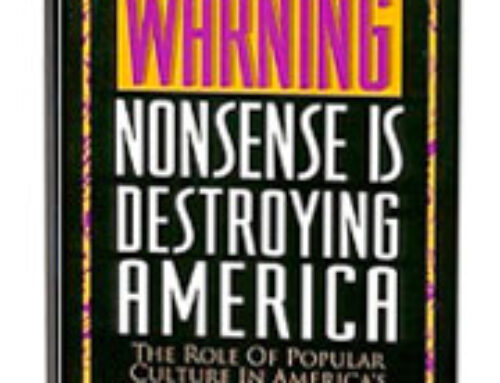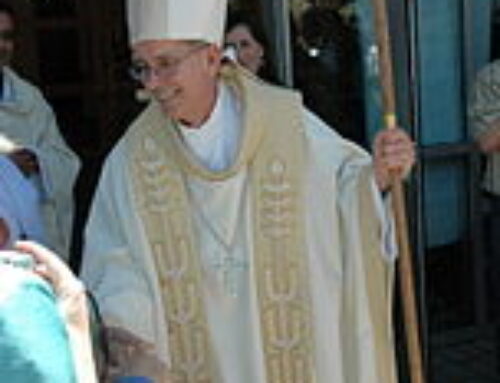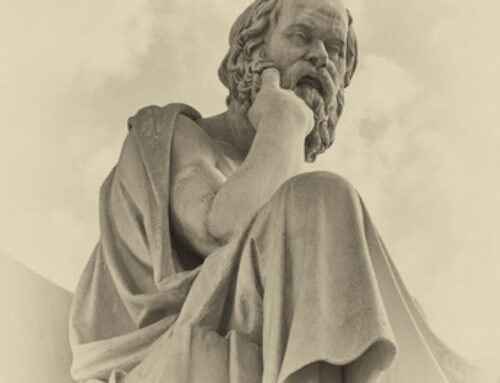
Virtually every statement the Bishops make on immigration includes a sentence like this one: “The Catholic Church’s work of assisting immigrants stems from the belief that every person is created in God’s image and all are deserving of human dignity.” There is nothing wrong such a statement, but its constant repetition suggests a denial that immigration is a controversial issue, let alone a quandary. In fact, it is both, and the Bishops’ apparent denial has done great mischief, as I will demonstrate.
On June 25, 2014 Bishop Mark Seitz, representing the USCCB, appeared before the House Judiciary Committee and delivered a lengthy statement. The statement is much too detailed to examine closely in this essay, but the following excerpt reveals its central premises. Note: to see the full text of this and the other USCCB statements discussed in this essay, just click on the dates they were published.
[BISHOP SEITZ]: “Pope John Paul II stated that there is a need to balance the rights of nations to control their borders with basic human rights, including the right to work: ‘Interdependence must be transformed into solidarity based upon the principle that the goods of creation are meant for all. ’In his pastoral statement, Ecclesia in America, John Paul II reaffirmed the rights of migrants and their families and the need for respecting human dignity, ’even in cases of non-legal immigration.’”
[In Strangers No Longer, U.S. and Mexican Bishops] “stressed that vulnerable immigrant populations, including unaccompanied minors and refugees, should be afforded protection.” [To this end, the Bishops noted that unaccompanied minors, due to their heightened vulnerability, require special consideration and care. Strangers No Longer also addresses the importance of families and ] “notes that humanitarian considerations for families should also be a priority when considering migration issues.” [Boldface added to both passages.]
Close examination of the italicized phrases is revealing. Though the right of nations to control their borders is mentioned, it is in effect contradicted by the statements that “the goods of creation are meant for all” and that refugees should be afforded protection because the sense of both is that refugees have a right to enter the country, legally or otherwise. Also interesting is the fact that throughout his testimony, Bishop Seitz almost exclusively refers to the response of governments and the Catholic Church to the “humanitarian crisis,” but never mentions American citizens, taxpayers, or Catholic parishioners, evidently forgetting that it is their taxes and contributions that fund the response.
The Bishops have made many other statements on immigration since Bishop Seitz’ address to Congress. The USCCB website lists eleven of them from January 2017 to August 2019. I will comment briefly on each. (All boldface is added):
[BISHOP VASQUEZ]: “I am disheartened that the President has prioritized building a wall on our border with Mexico. This action will put immigrant lives needlessly in harm’s way . . . [and make migrants]. . . more susceptible to traffickers and smugglers . . . I will continue to follow the example of Pope Francis. We will ‘look to build bridges between people, bridges that allow us to break down the walls of exclusion and exploitation.‘“
“The announced increase in immigrant detention space and immigration enforcement activities . . . will tear families apart and spark fear and panic in communities. While we respect the right of our federal government to control our borders . . . we remain firm in our commitment to comprehensive, compassionate, and common-sense reform.. . . The policies announced today will only further upend immigrant families . . . We will continue to support and stand in solidarity with immigrant families.
The Bishop’s use of the general words “immigrant” and “migrant” leave no doubt that he makes no distinction between legal and illegal, a distinction that is central to the entire issue. Also, if a wall is inappropriate, then what, specifically, is appropriate? Merely saying “comprehensive, compassionate, and common-sense reform” does not answer that question. Nor does the reference to John Paul’s metaphor, building bridges, not walls, do so.
[Bishop Vasquez]: “We believe in the inherent value of subsidiarity, and as spiritual leaders who minister to and live every day in our communities, we recognize the importance of relationships between local law enforcement and the people of the communities that they police . . . I call upon Congress and the Administration to work together to . . . preserve family unity, ensure the due process of law, protect those fleeing persecution, and ensure the integrity of our nation’s borders.”
It is curious that the Bishop claims allegiance to subsidiarity while calling for federal action. Subsidiarity is the principle of preferring state action to federal and community action to state. Even more curious is the omission, in all the USCCB statements discussed here, of any reference to Pope Leo XIII, who conceived the principle, or to Rerum Novarum, in which he expressed it.
[BISHOP VASQUEZ]: Included in this statement are five principles that should guide the treatment of immigrants: “(1) People have the right to find opportunities in their homeland, (2) People have the right to migrate to support themselves and their families, (3) Sovereign nations have the right to control their borders, (4) Refugees and asylum seekers should be afforded protection, and (5) The human dignity and human rights of undocumented migrants should be respected.”
According to these principles, nations have but a single right—to control their borders. The other four rights belong to immigrants. Moreover, all four rights of immigrants, by implication, create obligations for nations. In other words, nations cannot infringe on immigrants’ right to migrate and they must afford immigrants protection and respect their human dignity and human rights. Sounds fair enough . . . until we look more closely. Taken together, the principles mean that nations can control their borders unless migrants decide to cross them, in which case, the nations must afford them protection and respect their dignity and rights. Another way to say this is, nations DO NOT have the right to protect their borders.
[USCCB President and Committee Chairman]: This statement begins by presenting the tragic story of a migrant and his daughter. It speaks of the “horrific images of Oscar Martinez and his daughter Angie Valeria who drowned in the Rio Grande Valley while attempting to flee persecution and enter the United States. This image cries to heaven for justice.This image silences politics.”
The statement goes on to assert that “all people, regardless of their country of origin or legal status, are made in the image of God and should be treated with dignity and respect,” and then to add, “We can and must remain a country that provides refuge for children and families fleeing violence, persecution, and acute poverty.”
It is noteworthy that the tragedy of a father and daughter attempting to flee persecution is used here as an argument for providing refuge to all those made in God’s image who cross our borders, legally or illegally, not just to avoid persecution but for virtually any reason. This is as shameful a manipulation of our emotions as it is a leap of logic!
[General Counsel, joined by Catholic Charities and others]: This statement opposed a new rule at HUD, that would give families composed of legal residents priority over “mixed-families”—that is families that include one or more illegal aliens living with them. The HUD rule was based on the fact that “many legal residents . . . have been waiting, some for many years, for access to affordable housing.” The USCCB stated, “We fear and anticipate that the influx of increased need [sic] derived from the impact of this proposed rule would be devastating to the low-income populations we serve. The rule would also threaten mixed-status families’ unity and well-being . . . More should be done to address the housing needs of everyone in this country, but it must not be done by forcing mixed-status families out of stable housing”. (Note: this argument was supported in a separate July 3 statement by two USCCB Committee chairmen
This statement makes clear that, in the USCCB’s view, legal citizens’ actual rights do not deserve any higher priority than illegal aliens’ presumed rights.
[USCCB President]: This statement objects to “the climate of fear created by the Department of Homeland Security’s announced immigration enforcement actions and the Administration’s new Interim Final Rule to drastically limit asylum,” and to its “unacceptable action to undermine the ability of individuals and families to seek protection in the United States.” He “condemn[s]” this approach because it will cause the “unacceptable suffering of thousands of children and their parents, and create widespread panic in our communities . . . I ask that persons fleeing for their lives be permitted to seek refuge in the U.S. and all those facing removal proceedings be afforded due process.”
This statement completely ignores crucial questions concerning refuge and asylum: Is every way of seeking refuge legitimate? If (as the Bishops admit) nations have a right to control their borders, do they also have the right to determine which ways of seeking refuge are legitimate and which are not? By failing even to acknowledge these questions, the statement betrays the Bishops’ presumption that no restriction on refuge is ever moral.
[Chairman of Committee on Migration]: “The implementation of this new policy will have unjust and unacceptable results and lead to more widespread family separation, stoking fear in our communities.”
This essay, like virtually all the others on the USCCB website, focuses exclusively on opposing policies that are designed to control the nation’s border. It follows the well-worn pattern of formulaically acknowledging the nation’s right to control its borders and then describing the plight of those who enter our country illegally and condemning the government’s efforts to control the border. As it that contradiction were not a sufficient insult to any reasonable person’s intelligence, the Bishops often classify the government’s efforts as a moral offense rooted in hatred of immigrants. The most charitable designation of this recurring pattern is baldly disingenuous.
[USCCB Letter to Senate Judiciary Committee]: Our approach to migration is rooted in the Gospel and in the life and teaching of Jesus, who himself was a migrant and refugee, forced to flee for his life with Mary and Joseph. While the Church recognizes the right of sovereign nations to control their borders, nations also have a strong obligation to treat all migrants humanely, to protect children at risk, and to protect those fleeing from persecution. As a nation of immigrants and refugees, we have a long history and commitment to providing welcome and protection for vulnerable immigrants and refugees.“
The Gospel, the life, and the teachings of Jesus are certainly a solid foundation for one’s view on any human issue. But just as the context and circumstances of issues can change, particularly over the course of centuries and millennia, so too the application of the foundational principles may vary. The above statement makes no mention of this fact, let alone discuss its relevance to the present immigration issue. And the last line seems to be advocating “welcome and protection” not just to children at risk and those fleeing persecution, but to a much broader class, the “vulnerable,” a change that is at odds with the rights of nations to control their borders.
[Chairman of Migration Committee]: “The rule would turn our back on the vast majority of asylum seekers, requiring them to apply for protection in almost any other country through which they transit, leaving access to U.S. asylum exceptionally rare. Not only do we believe that this rule is unlawful, but it also jeopardizes the safety of vulnerable individuals and families fleeing persecution and threatens family unity. Further, the rule undermines our nation’s tradition of being a global leader providing and being a catalyst for others to provide humanitarian protection to those in need. We remind the Department of Justice and the Department of Homeland Security thathow we respond to asylum seekers arriving at our border is a test of our moral character and strongly urge the Administration to rescind this rule.”
Asylum seekers, by definition, are those who are seeking refuge from persecution, often for political reasons. But as the Bishops surely know, there has been a problem differentiating such immigrants from those who merely (and understandably) are seeking prosperity. Traveling through several countries before arriving at the U.S. border and seeking asylum raises questions about which category one is in. Given the complexity of the asylum issue, to suggest that the Administration’s policy indicates a moral failing is presumptuous and therefore imprudent.
[Committees on Migration and Domestic Justice]: “[The Department of Homeland Security] rule will undermine family unity and lead many lawful immigrants to forgo vital assistance, including enrollment in nutrition, housing, and medical programs. Families already in the U.S. will be faced with deciding whether to access critical assistance programs for which they qualify, knowing that in doing so they could jeopardize their ability to stay here with their loved ones. And, it will reduce the ability of many to reunify with family in the U.S. We have already seen the culture of fear that the anticipation of this rule has created in our communities. Ultimately, we believe that this rule is in tension with the dignity of the person and the common good that all of us are called to support.”
Here in brief is the Bishops’ argument: The government’s efforts to remove people here illegally from the homes of relatives who aid and abet their illegal behavior is a violation of the dignity of those persons and of the common good—in other words, a sin. The reasoning here is upside-down. It makes breaking the law a moral act and arresting lawbreakers a despicable, even sinful act.
Let me pause for an important observation.
The Catholic Bishops regularly preface their statements on immigration by affirming that sovereign nations have the right to control their borders but then proceed to condemn government officials for exercising that control. But here is the interesting fact—they never claim that the immigration laws are unjust or immoral. But that argument would be a powerful addition to their defense of illegal immigration. So why don’t they make it? Because doing so would raise the embarrassing question, “If it is immoral, why do you keep saying it is every nation’s right”? They cannot answer that question without acknowledging that their opposition to the Trump administration’s immigration policy has shallow and arguably fallacious roots.
Note: A good part of this statement by the Counsel General argues against the administration’s restrictions on immigration, not on the basis of moral principle, but instead on congressional acts, United Nations precepts, and international agreements. This is curious because, even though the document is written by the USCCB General Counsel, it is the Bishops’ document, so one could reasonably expect it to focus more on moral reasoning than legal precedent.
“Rather than attempting to undermine our current asylum commitment through administrative fiat, the U.S. should look to address the root causes of migration at a regional level. It should invest in expanded programming to address the needs of vulnerable families and children in the Northern Triangle, help build capacity of the Mexican and other regional asylum systems, and support additional avenues for seeking protection in the U.S.}
The quoted statement is unfortunately biased in its phrasing. Rather than speak of “undermining” through “administrative fiat,” the statement could have more fairly spoken of the “issue of asylum” and the “question of root causes.” The statement also carelessly assumes an either/or situation when in fact the two matters are not mutually exclusive.
Finally, it is curious that in this long document (5000 words) on the safety of refugees there is not a single reference to “parishioners,” “taxpayers,“ or citizens”—that is, to the people who pay the cost of illegal immigration—tens of billions of dollars annually! Nor is there a single reference to “justice” for those groups. The word “rights” is used twelve times in reference to migrants, but not once in reference to U.S. citizens. Such omissions cannot be excused by saying the subject of the document is migrants—the subject is immigration and its impact on those created in God’s image, which includes citizens as well as migrants.
The other documents I have discussed in this essay generally follow the same pattern of focusing on migrants alone. This fact demonstrates that, like the “nearsighted shepherd” in my fable, the Bishops have lost sight of their flocks. Their nearsightedness has also led to a graver deficiency—ignoring a singular source of relevant theological and philosophical insight: Pope Leo XIII’s Rerum Novarum. Part 3 of this essay will explain that encyclical’s relevance to contemporary immigration and suggest how U.S. Bishops can profit from its wisdom.
Copyright © 2019 by Vincent Ryan Ruggiero. All rights reserved



